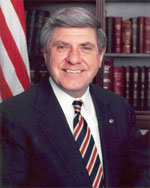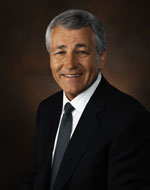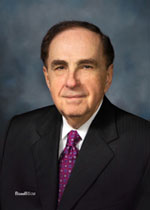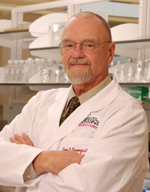 |
U.S. Sen. Ben Nelson |
 |
U.S. Sen. Chuck Hagel |
 |
Harold M. Maurer, M.D. |
 |
Tom Rosenquist, Ph.D. |
Department of Defense (DOD) earmarks for UNMC totaling $9.5 million were approved by the Senate Armed Services Committee and now await approval by the full Senate.
Last week, the full Senate also approved a $2 million Department of Transportation, Housing and Urban Development earmark to fund design and environmental plans for relocating Saddle Creek Road. Results from the first phase of a feasibility study about relocating the road will be released next month.
The Saddle Creek earmark and the DOD earmarks — should they get approved by the Senate — also need approval by the full Congress and the president before being enacted.
“I want to express our gratitude to Sens. Ben Nelson and Chuck Hagel for their support of UNMC and helping us in this funding process,” said UNMC Chancellor Harold M. Maurer, M.D. “This latest news is a good sign that UNMC will receive support that is essential to becoming a world-class academic health science center.”
The UNMC DOD earmarks that advanced to the Senate floor on Wednesday were:
- $4 million to develop a vaccine to fight a group of respiratory pathogens capable of being used to attack military and civilian populations across the globe. The vaccine is being developed by Alexander “Sasha” Kabanov, Ph.D., director of the UNMC Center for Drug Delivery and Nanomedicine and Parke-Davis Professor of Pharmaceutical Sciences;
- $3.5 million to complete development of miniature in vivo robots for telesurgery in combat environments. These robots — designed by UNMC’s Dmitry Oleynikov, M.D., and University of Nebraska-Lincoln robotics expert Shane Farritor, Ph.D. — are wireless and can be placed entirely within a patient’s abdominal cavity by a medic on the battlefield to provide diagnostic, imaging and surgical capabilities to a remote surgeon. This project received a $2.25 million earmark in fiscal year 2006; and
- $2 million to improve an on-the-battlefield video laryngoscope — a device used to look down a patient’s throat when health professionals insert a breathing tube. The goal is to reduce the dangers of having lesser-trained individuals conduct the procedure on the battlefield. The laryngoscope improvements are being developed by Ben Boedeker, M.D., Ph.D., associate professor in the department of anesthesiology.
Nelson — a member of the influential Senate Appropriations Committee and the Senate Armed Services Committee — said he is glad to help UNMC secure funding for such important work.
“UNMC has become a premier research institute and that work is now helping to protect and treat our men and women in uniform,” Nelson said. “I’m very proud to help in these efforts, which I know will continue to produce medical breakthroughs while spurring economic growth in our area.”
Hagel said the possible Saddle Creek Road realignment stands to greatly benefit UNMC and the city of Omaha as a whole.
“The possible realignment of Saddle Creek Road can serve as a catalyst to enhance surrounding neighborhoods and businesses in the midtown area,” Hagel said. “This study will frame up options to alleviate flooding along Saddle Creek Road, improve pedestrian safety and address existing traffic flow problems in the area.”
Tom Rosenquist, Ph.D., vice chancellor for research, joined Dr. Maurer in his praise for Nelson and Hagel and also lauded the work of Renee Fry, J.D., former director of the UNMC Government Affairs Office, and government relations specialist Sara Cizek, J.D., in rounding up congressional support for UNMC.
“If approved, these funds will prove invaluable to our research endeavors at UNMC,” Dr. Rosenquist said. “Renee and Sara deserve a lot of credit for their tireless work and advocacy on behalf of UNMC. We are in this position today because of their work.”
Fry — who recently took over as director of UNMC Public Affairs — credited UNMC Director of Research Resources Paula Turpen, Ph.D., for her help, particularly in crafting the earmark proposals.
“Dr. Turpen is an integral part of the government relations team,” Fry said. “Her knowledge of science and her ability to translate scientific language in such a way that makes it understandable to lay readers is remarkable and was essential to this process.”